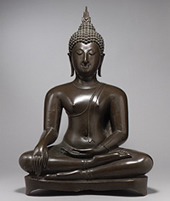Forest
Temple of Southern Indiana
Forest Temple of Southern Indiana
Inc.
3698 N Russell Road,
Bloomington, IN 47408
Tel: (812) 335-0171 Web:
www.watindiana.org
วัดป่าอินเดียน่า
Welcome to the Forest
Temple of Southern Indiana

วัดป่าอินเดียน่าตั้งขึ้นมาโดยมีวัตถุประสงค์ดังนี้:
Dec1stCeremonyletter2013.htm
The Forest Temple of Southern Indiana was created to serve
the following purposes:
- เพื่อเป็นศูนย์รวมให้พุทธศาสนิกชนได้บำเพ็ญศาสนกุศล
- To create a center where the follower of Buddhism
to practice their faith
- เพื่อเป็นเสนาสนะให้พระภิกษุสงฆ์ได้อยู่ปฏิบัติศาสนกิจและเผยแผ่ธรรมะ
- To provide a place for Bhikkhus
(Buddhist Monks or Sangha) to live and
teach the Dhamma (Buddhist Teaching)
- เพื่อเสริมสร้างความสัมพันธ์อันดีระหว่างชุมชนชาวพุทธ
ชาวอินเดียน่า
และมหาวิทยาลัยอินเดียน่า
- To promote relations between the Buddhist
communities, Indiana residents and Indiana University
- เพื่อเป็นศูนย์กลางในการศึกษาเรียนรู้ภาษาและวัฒนธรรมไทย
- To provide a center where the Thai language and
culture can be practiced
More detailed about "Buddha Dhamma Sangha Bhikkhus" here and here.
The daily
schedule of the monks is as follows:
7:00 am-8:30 am Chanting,meditation
9:30 am-10:00 am Alms Rounds
10:00 am-11:00 am
Dhamma
Discussion
8:00pm-9:30 pm Chanting, Meditation
The Thai word
"Wat Pah
Indiana" literally meaning "Forest Temple of
Indiana" signifies that the Center is a place of detachment and
tranquility, a place for contemplation and meditation, and a refuge from
the sufferings of the world. In Buddhism, there are three supreme objects
of worship, namely, the Buddha, His Teaching or Dhamma,
and the collective community of monks, or Sangha.
The Three are known together under the name "the Triple Gem."
The word “Buddha”
means 'the Enlightened One". Normally, he is referred to as the
"Supreme Teacher". The man who became the Buddha was born
Prince Siddhartha in the year 603 B.C. in a small territory near what is
now the Indian-Nepalese border. At the age of 35, after 6 years
0f
rigorous meditation he had found the right
way and had gained the supreme enlightenment experience, and hence was
known as the Buddha. The Word "enlightenment" does not mean a
revelation from some divine being, but a discovery made by himself on the
most profound and all embracing insight into
the nature of mind and all phenomena. He had attained the complete
extinction of the fires of greed, hatred and ignorance, thus freeing
Himself from all inner sufferings. This is the state of Nibbana,
the ultimate goal of Buddhism.
His Teaching or Dhamma
is contained in the Tipitaka, the three
divisions of the Buddhist Canon, i.e., the Books of Discipline, the Books
of Discourses, and the Books of Higher Doctrine. The word "Dhamma" literally means the "ultimate truth
underlying all existence".
The third symbol of
veneration is the Sangha, the Order of
Buddhist Monks (Bhikkhus).
The monks at the Wat Pah
Indiana
belong to the Dhammayutika
Sect of
Thailand
. We call ourselves "forest monks"
to denote our emphasis on meditation and the strictest interpretation of
the Books of Discipline. A forest monk must observe the strictest of
celibacy rules with regards to the feminine sex. He has to be moderate in
his diet, and will take only one meal per day and only in the hours
between dawn and noon. He will take only the food that is offered to him
and must not cook for himself. You may see a monk walking by on his alms
round in the morning. This is the traditional way for a monk to receive
food offerings from local people. Another important task for a forest
monk is to meditate, to develop calmness of the mind and to gain insight
into the true nature of life. The term "forest monk" is a
historical one signifying the monk who seeks solitude and simplicity in
the forest to intensify his practice. The aim, of course, is to reach
Enlightenment or Nibbana.